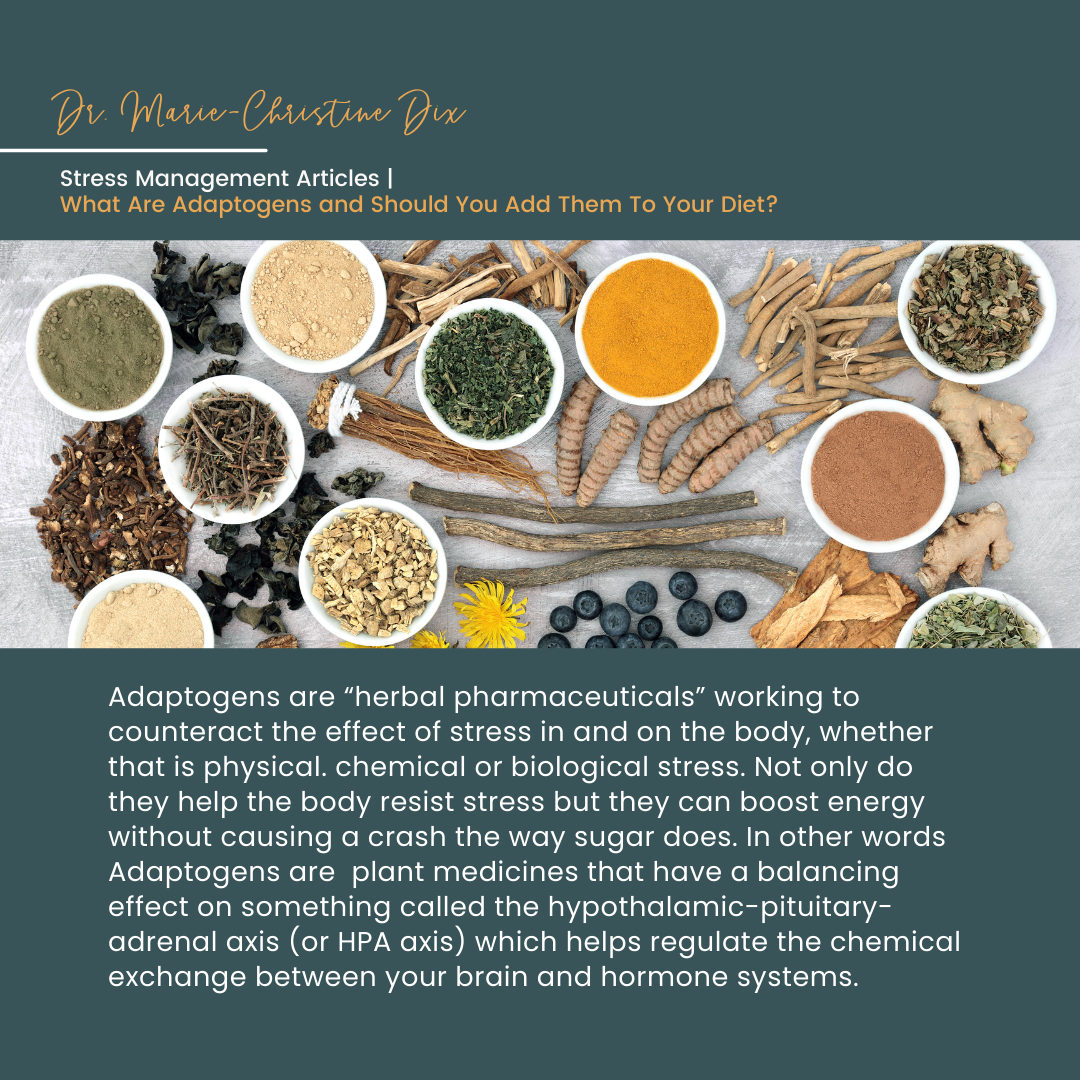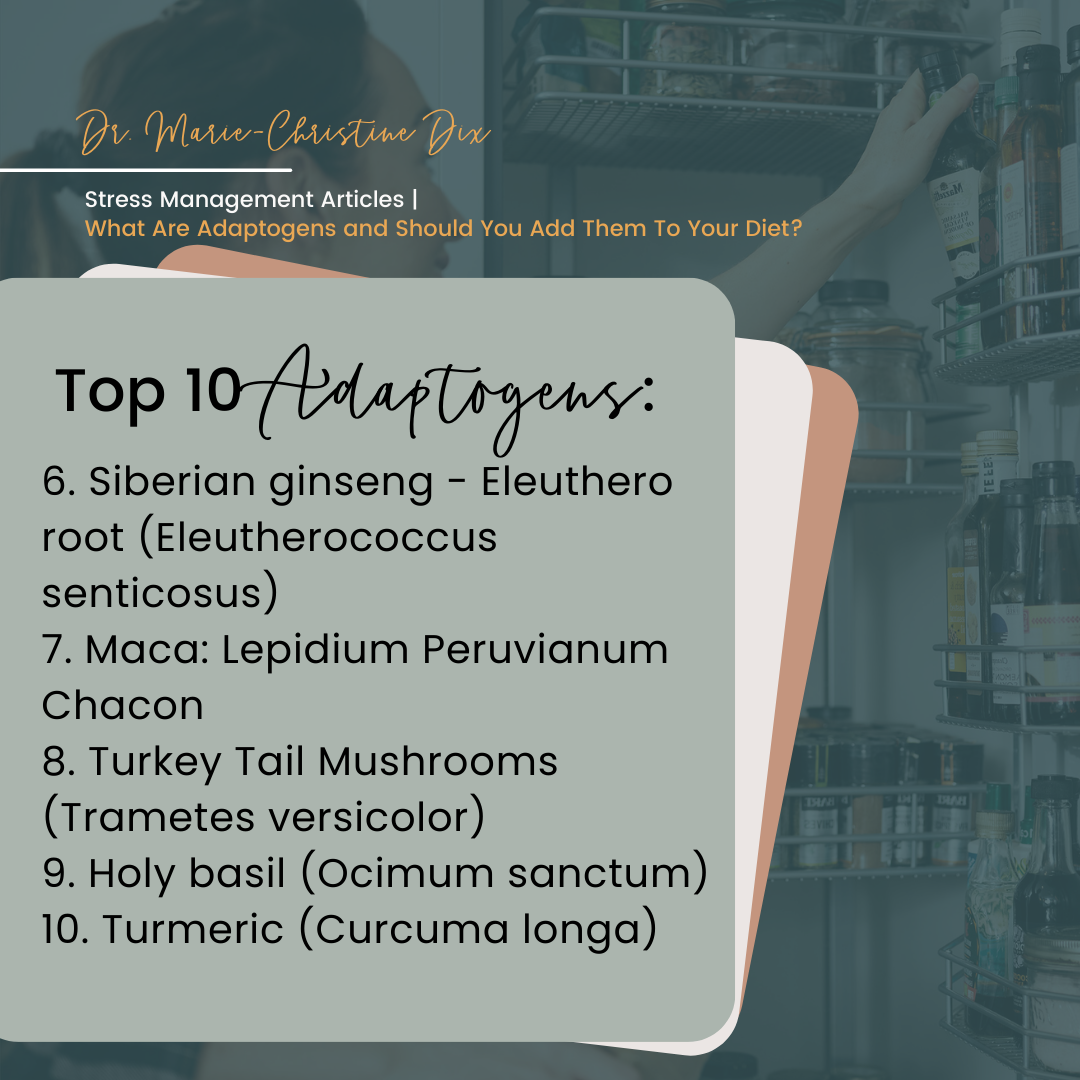What Are Adaptogens, and Should You Add Them to Your Diet?
What Are Adaptogens, and Should You Add Them to Your Diet?
Blog summary:
Why we need adaptogens?
What are adaptogens ?
How do adaptogens work?
Where do I get adaptogens from and how do I include them in my lifestyle?
Recipes:
Adaptogenic Protein Smoothie
Adaptogenic Latte Recipe
Adaptogenic Hot Chocolate Recipe
Quick reference.
If the coronavirus pandemic taught us anything, it is that chronic stress and living in an upregulated “fight or flight” state in constant anxiety is not only exhausting, but also negatively affects our mental health and our physical health. Stress, is a word that we all know well and I am sure most can relate to experiencing too at some point or another? Modern life can be stressful and for many of us it is all too common to feel like a circus performer juggling workloads, childcare, pets, personal projects, family relationships, household chores, personal relationships…..the list goes on.
It is most definitely bad for our health yet for many of us it has become the norm to some degree, and often we are not fully aware of how stressed we actually are until it is too late! We all have very different coping strategies when it comes to the dreaded “S” word, for some it may be fuelling ourselves with caffeine to wake up or stay stimulated enough to function at life. Others it may be reaching for sugary or processed foods that give us that temporary “fix” or short term satisfaction, for the next person it may be indulging in more alcohol than we know is good for us! If any of the above sounds familiar, next time you go to reach for your “go to fix”; STOP, there is another way to cope with stress. ADAPTOGENS!
Adaptogens are “herbal pharmaceuticals” working to counteract the effect of stress in and on the body, whether that is physical. chemical or biological stress. Not only do they help the body resist stress but they can boost energy without causing a crash the way sugar does. In other words Adaptogens are plant medicines that have a balancing effect on something called the hypothalamic-pituitary-adrenal axis (or HPA axis) which helps regulate the chemical exchange between your brain and hormone systems.
Chronic stress is far too common, and over time your body can pay a high price. Adaptogens have the ability to help you adapt to life’s stressful situations. When you feel under stress, your nervous system responds by releasing a flood of stress hormones.
Read more about hypothalamic-pituitary-adrenal (HPA) axis here. ( https://www.ncbi.nlm.nih.gov/pmc/articles/PMC3991026/ )
Research ( Effects of Adaptogens on the Central Nervous System and the Molecular Mechanisms Associated with Their Stress-Protective Activity - https://pubmed.ncbi.nlm.nih.gov/27713248/ ) suggests that when you are under ongoing chronic stress you may experience fatigue, depression and anxiety. You will find it difficult to see situations clearly and the quality of your performance may also drop.
A number of clinical trials demonstrate that adaptogens exert an anti-fatigue effect that increases mental work capacity against a background of stress and fatigue, particularly in tolerance to mental exhaustion and enhanced attention.
Adaptogens can help your body in many different ways:
Increase resistance to stress
Reduce inflammation
Anti-fatigue properties (physical and mental)
Antidepressive effects
Improves immune function
Decreases the chance of “stress” weight gain
Stimulant for the central nervous system
Supports optimal hormone function and balance
If we learn to cope with stress better and implement daily tools to support our bodies ability to manage and adapt to stress, not only will we feel better but we also perform and function better to.
So you may ask:
Where do I get adaptogens from and how do I include them in my lifestyle?
You need to be aware of the fact that each adaptogen has a different effect on the body.
Top 10 adaptogens and their potential benefits:
1) American ginseng (Panax quinquefolius)
Enhances physical performance (including sexual), promotes vitality and increases resistance to stress and ageing. The adaptogenic properties of ginseng are believed to be due to its effects on hypothalamic-pituitary-adrenal axis, resulting in elevated plasma corticotropin and corticosteroids levels.
https://pubmed.ncbi.nlm.nih.gov/10930706/
2) Ashwagandha (Withania somnifera)
Reduces stress and anxiety. https://pubmed.ncbi.nlm.nih.gov/32021735/
3) Astragalus (Astragalus membranaceus)
The anti-cancerous activity of adaptogenic herb. Astragalus membranaceus has demonstrated the ability to modulate the immune system. https://pubmed.ncbi.nlm.nih.gov/34479785/
4) Cordyceps (Cordyceps militaris)
Well-known entomophagous fungus, naturally distributed in the Tibetan Plateau of Asia and Himalayas. Adaptogenic, aphrodisiac, anti-oxidant, anti-aging, neuroprotective, nootropic, immunomodulatory, anti-cancer, boosts stamina. https://pubmed.ncbi.nlm.nih.gov/32288795/
5) Goji berry (Lycium barbarum)
Dried goji berries are cooked before they are consumed. Goji berries are high antioxidant potential fruits which alleviate oxidative stress to confer many health protective benefits such as preventing free radicals from damaging DNA, lipids, and proteins. Boosts energy. Boost physical and mental performance,Supports feeling calm. Helps with achieving deeper sleep.
6) Siberian ginseng - Eleuthero root (Eleutherococcus senticosus)
Scientific evidence presented by clinical trials of adaptogens in fatigue, suggests eleuthero root improves focus and staves off mental fatigue. It is also used to boost immunity, and as an antimicrobial and chemoprotectant. However, no good human evidence supports any of these uses. No data exist on the safety and efficacy of eleuthero in nursing mothers or infants. In general it is well tolerated but may increase blood pressure, increase bleeding and increase blood sugar. Breast tenderness has also been reported. Most sources recommend against the use of eleuthero during breastfeeding because of a lack of safety data. https://pubmed.ncbi.nlm.nih.gov/30000865/
7) Maca: Lepidium peruvianum Chacon
Therapeutic Effects of Pre-Gelatinized Maca (Lepidium Peruvianum Chacon) used as a Non-Hormonal Alternative to HRT in Perimenopausal Women - Clinical Pilot Study. Two months administration of Maca-GO significantly alleviated symptoms of discomfort observed in majority of women involved in the study (74%-87%) as assessed by Kupperman's Menopausal index. This was associated with significant increase in E2 and FSH, Progesterone and ACTH levels, and reduction in blood pressure, body weight, Triglycerides and Cholesterol levels. https:/https://pubmed.ncbi.nlm.nih.gov/23674976/
8) Turkey Tail Mushrooms (Trametes versicolor)
The mycelium of the Trametes versicolor (Turkey tail) mushroom and its fermented substrate each show potent and complementary immune activating properties in vitro. https://https://pubmed.ncbi.nlm.nih.gov/31791317/
9) /Holy basil (Ocimum sanctum)
Tulsi has been found to protect organs and tissues against chemical stress from industrial pollutants and heavy metals, and physical stress from prolonged physical exertion, ischemia, physical restraint and exposure to cold and excessive noise. Tulsi has also been shown to counter metabolic stress through normalization of blood glucose, blood pressure and lipid levels, and psychological stress through positive effects on memory and cognitive function and through its anxiolytic and anti-depressant properties. Reduces physical and mental stress, stress-related anxiety, and depression. https://pubmed.ncbi.nlm.nih.gov/25624701/
10) Turmeric (Curcuma longa)
Curcumin is known recently to have antioxidant, anti-inflammatory, anticancer effects and, thanks to these effects, to have an important role in prevention and treatment of various illnesses ranging notably from cancer to autoimmune, neurological, cardiovascular diseases, and diabetic. Boosts brain function and reduces depression. Curcumin for depression: a meta-analysis:https://pubmed.ncbi.nlm.nih.gov/31423805/
Quick reference:
Best for hair and nails: Chaga, cordyceps, jiaogulan
Best for stress: Rhodiola, mucuna pruriens, ashwagandha
Best for fatigue: Ginseng, maca
Best for sex drive: Shilajit
Best for brain fog: Holy basil, rhaponticum
Best for immunity: Maca, chaga, turkey tail, ashwagandha
Best for anxiety: Lion’s mane, ashwagandha
Best for blood sugar: Reishi
Best for digestion: Holy basil, licorice root
ADAPTOGENIC PROTEIN SMOOTHIE RECIPE:
1 whole ripe banana
1 handful baby spinach
1 1/2 cups unsweetened almond milk
2 Tbsp unsweetened almond butter
1/2 tsp ashwagandha powder
1/2 tsp maca powder
1 tsp ground cinnamon
Blend well in a high speed blender.
ADAPTOGENIC LATTE RECIPE:
Organic decaffeinated coffee
1 tsp ashwagandha powder
2 cups boiling water
maple syrup or local raw honey to taste
1/4 cup steamed oat milk or almond milk (unsweetened)
Once you made the coffee blend well with the rest of the ingredients in the blender.
ADAPTOGENIC HOT CHOCOLATE RECIPE
1 mug of hot water or unsweetened dairy-free milk
1 Tbsp unsweetened cacao powder
1/2 tsp Ashwagandha
1 tsp Reishi mushroom powder
1 tsp Maca
1 tsp coconut butter (or sub store-bought)















